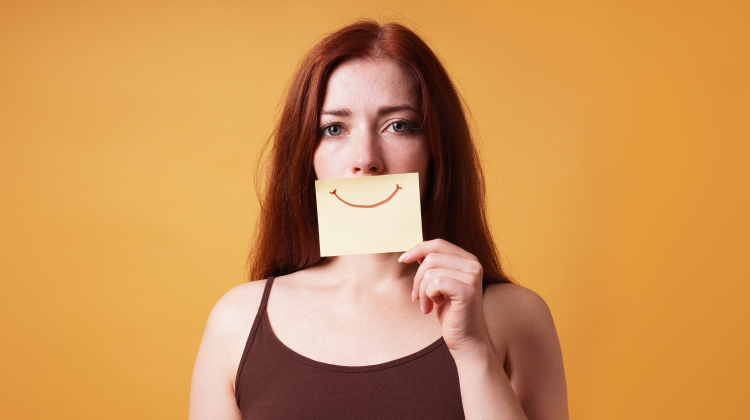Smiling Depression: What It Is, Symptoms, Risks & Treatments 2024

“Smiling depression” is when you hide your true feelings and pretend everything’s fine. You may go about your day normally without anyone noticing that you’re suffering, including yourself. You might feel embarrassed, guilty, or ashamed to admit your feelings, so it becomes easier to hide behind a smile instead.
It’s an atypical depression as the normal signs we look for aren’t visible. Those experiencing smiling depression may not even be aware they’re in need of emotional support. This means they may also be more prone to suicide[1] when they don’t seek treatment.
What Is Smiling Depression?
Depression comes in all shapes and sizes, with some people not even realizing they’re depressed. Smiling depression is a type of depression where life looks normal on the outside, but on the inside, you might feel many of the typical symptoms of Major Depressive Disorder (MDD)[2].
It’s slightly different from high-functioning depression, which is a persistent depressive disorder (PDD), and more chronic. While neither smiling nor high-functioning depression is classified in the diagnostic and statistical manual of mental disorders, they are becoming a more popular diagnosis.
Unfortunately, while smiling depression is common, it’s difficult to officially diagnose or treat as people may be afraid or unwilling to admit their feelings.
Currently, the world health organization (WHO) estimates that over 280 million[3] people worldwide have depression and reports it’s growing. While it’s becoming more common to speak openly about mental health issues, the majority of the population still struggles to accept their emotions and seek help.
Why Do People Hide Their Depression?
There are many reasons why people hide their depression. Overall, it stems from a culture that invalidates emotions and views depression as a weakness.
Social Stigma
The majority of our ancestors lived in survival mode. Out of necessity, this created the belief that being anything but hard-working and optimally functional was a weakness. Now, comfortable living conditions are becoming more common in developed countries, but unfortunately, not worldwide.
Overall, higher standards of living are still relatively new and likely not the situation many parents or grandparents grew up with. Despite the improved conditions, old beliefs are passed down through each generation.
With the continued social stigma attached to mental illness, many people develop smiling depression to fit in and avoid being judged or estranged from their family and social circle.
Men[4] especially are less likely to recognize or seek treatment for depression. Our culture still portrays men as the breadwinners of the family and puts harsh demands on them to feel or express little emotion.
Parental Upbringing
Generational trauma[5] is when parents raised in emotionally harsh or abusive environments are more likely to pass the effects of their trauma on to their children.
Unresolved childhood trauma often leads to emotionally immature parents who are unable to validate, accept, and hold a safe emotional space for their children. This heavily impacts early childhood development and the ability to express emotions.
Smiling depression falls in line with children raised in this environment, where they may develop an inability to show vulnerability or fully express themselves.
Denial
Accepting that you need help and that your life may need a big change is hard. Society still praises self-reliance and in general, humans have a natural fear of change. If it’s career or marital woes, it may also mean financial struggles are ahead.
Sometimes, it feels easier to deny something is wrong as the consequences of accepting the situation may be too overwhelming to think about.
Guilt
Living with high levels of guilt and shame[6] is common. It may also be the case for people who have everything they’re supposed to want, such as a home, spouse, or career, and yet they feel empty inside.
Feeling ashamed for having things and yet feeling sad can lead to smiling depression, where you don’t feel safe admitting your true desires.
Lack Of Support
Many people don’t have access to a strong support system. Even if family isn’t an option, a close community of friends can help stave off depression[7].
However, many people live alone, work from home, and feel isolated. There may also be a lack of access to therapy or barriers because of expense.
Self-Medicating
With the difficulty, many people feel in embracing their negative emotions, self-medicating instead of seeking professional help becomes a common option. This may include marijuana, alcohol, prescription drugs, etc.
Symptoms
Smiling depression has atypical features hidden from the outside world. While we imagine depressed people to be lethargic and unsocial, the physical and emotional signs may be unaware even to the person experiencing them.
On top of that, the signs and symptoms experienced internally are different for everybody.
Physical Symptoms
- Digestive issues (IBS symptoms, upset stomach, ulcers)
- Headaches
- Fatigue, lethargy
- Muscle or joint pain
- Difficulties sleeping
- Weakened immunity (getting sick more often)
- Weight loss or gain (and/or changes in appetite)
- Changes in heart rate or blood pressure
Emotional Symptoms
- Loss of interest in previously enjoyed activities
- Anger, irritability
- Constantly unsatisfied
- Anxiety
- Guilt
- Hopelessness
- Low self-esteem and self-worth
- Suicidal thoughts
Subtle Signs of Smiling Depression
Since it’s often difficult to recognize or accept emotions, here are some subtle clues, varying by person, that you may have smiling depression.
- Doing things only because you feel you “should”
- Intense focus on tasks, responsibilities, and accomplishments
- Covering up any signs or expressions of vulnerability
- Making more excuses to not do things
- Not enjoying anything you do
- Speaking more philosophically or fatalistically
- Difficulty concentrating or making decisions
- Feeling lonelier, more rigid, or anxious than usual
- Watching TV/movies or using social media more
- Detaching emotionally from friends, colleagues, and family
If you’re experiencing any of these symptoms, it’s best to talk to someone, whether it be a therapist or a trusted friend.
Unlike momentary sadness, depressive symptoms may remain for long periods of time and aren’t always affected by external circumstances. Fortunately, mental health conditions and major depression can improve with treatment.
Even if you don’t think you have depression symptoms, having a mental health professional to help guide you toward improving your life is priceless.
A therapist can help you discover your true needs and desires. It can also help build your self-confidence and self-worth, giving you the motivation you need to make changes and create the life you want.
Risks
A society that praises wealth, achievement, and appearances over mental health and emotional fulfillment puts many people at risk of developing smiling depression. Certain situations put some people even more at risk.
Emotionally Immature Parents
Adult children of emotionally immature parents experience many symptoms of depression and anxiety. They did not have their emotional needs[8] met as children, such as acceptance, validation, and a safe space to fully express themselves.
They also may have had an overly strict or authoritative upbringing where their opinions and feelings did not matter. This stunts emotional development and can lead to mental disorders.
Fortunately, different types of family therapy effectively reduce behavioral and emotional issues. As adults, each person develops different symptoms, such as
- Frequent sense of loneliness
- Inability to show vulnerability
- Perfectionism or OCD-like[9] behaviors
- Frustration from life choices that weren’t their own (degree, career, relationships, etc.)
- High levels of guilt and shame
- Inability to set boundaries
Big Life Changes
Going through one of life’s many changes can bring about smiling depression and anxiety.
- Divorce or breakup
- Career change, job loss, or retirement
- Loss (death, adult children leaving the house)
- Moving or major domicile disruption (e.g., housefire, natural disaster)
- Arrival of a new baby
- Financial struggles
Social Media
The prevalent use of social media has been shown[10] to increase feelings of loneliness and depression. Around 70%[11] of Americans use some form of social media and the numbers are growing.
A culture is developing that shows highlights but avoids the hard realities of daily life. This often leads people to believe they are alone in their struggles and that they should strive to appear happy rather than pursue helpful wellness professionals.
Risks Associated With Smiling Depression
In general, people with smiling depression are less likely to seek help. They may not believe they have mental health problems or that they require a medical professional.
They display characteristics more similar to high-functioning depression, which could mean they have more energy to follow through on suicide. If you’re not sure how you feel, you can also try taking a smiling depression test online[12].
Treatments
Fortunately, treatment for smiling depression is effective. A mix of psychotherapy with healthy lifestyle changes produces the best results.
Psychotherapy

Several different types of talk therapy can help those with smiling depression.
- Cognitive behavioral therapy (CBT)[13]
- Interpersonal[14] therapy
- Acceptance and commitment therapy or compassion-focused therapy (CFT)
Healthy Lifestyle Changes

There are many habits you can develop that reduce depression and anxiety, such as
- Eating mostly nutrient-dense foods
- Exercising at least 150 minutes[15] a week
- Sleeping 7-9 hours a day
- Participating in self-care activities regularly: rest and relaxation, such as taking the time to read or watch uplifting movies and TV shows or participating in fun hobbies and therapeutic activities such as creative writing, painting, woodworking, learning an instrument or language, dance classes, singing lessons, etc.
- Practicing self-compassion[16]
- Prioritize fulfilling relationships[17] and creating connections: friendships, family, meeting new people through hobbies
- Spending time in nature: 15 minutes in green space[18] per day or quiet nature time or hiking on weekends, with 150 minutes[19] per week total
- Reducing time spent on social media to less than 10 minutes[10] a day
Things to Keep In Mind When Considering a Therapist

If you choose to see a therapist, recognize it may take a few tries until you find a good fit with someone you feel comfortable with. If you don’t feel ready to meet in person, the convenience of an online session might be exactly what you need.
With time, you may feel comfortable going in person, which can offer the opportunity for a variety of therapeutic techniques. These include EMDR[20] (Eye Movement Desensitization and Reprocessing) and the Swish[21] technique, to help your brain learn how to process thoughts and events differently.
The Bottom Line
Many people with smiling depression don’t acknowledge they’re depressed. Instead, they often try to cope with their feelings on their own. They may try to fight their feelings, believing that they shouldn’t feel sad, rather than accepting them and seeking treatment.
If you experience any physical symptoms, feel emotionally disconnected, or are without much pleasure in life, consider talking to someone. Even opening up to a friend has the power to change your life.
Depression is draining and seeking help can steer you toward a fulfilling and meaningful life. Know that the most common cause of suicide is unrecognized, untreated, or inadequately treated depression of any kind.
+ 21 sources
Health Canal avoids using tertiary references. We have strict sourcing guidelines and rely on peer-reviewed studies, academic researches from medical associations and institutions. To ensure the accuracy of articles in Health Canal, you can read more about the editorial process here
- McCarter, T. (2008). Depression overview. American health & drug benefits, [online] 1(3), pp.44–51. Available at: https://www.ncbi.nlm.nih.gov/pmc/articles/PMC4115320/
- National Institute of Mental Health (NIMH). (2022). Depression. [online] Available at: https://www.nimh.nih.gov/health/topics/depression
- World (2021). Depression. [online] Who.int. Available at: https://www.who.int/en/news-room/fact-sheets/detail/depression
- National Institute of Mental Health (NIMH). (2017). Men and Depression. [online] Available at: https://www.nimh.nih.gov/health/publications/men-and-depression
- Grand, S. and Salberg, J. (2020). Trans-Generational Transmission of Trauma. Social Trauma – An Interdisciplinary Textbook, [online] pp.209–215. doi:10.1007/978-3-030-47817-9_22.
- Sutherland, J.-A. (2010). Mothering, Guilt and Shame. Sociology Compass, [online] 4(5), pp.310–321. doi:10.1111/j.1751-9020.2010.00283.x.
- Marver, J.E., Galfalvy, H.C., Burke, A.K., Sublette, M.E., Oquendo, M.A., Mann, J.J. and Grunebaum, M.F. (2017). Friendship, Depression, and Suicide Attempts in Adults: Exploratory Analysis of a Longitudinal Follow-Up Study. Suicide and Life-Threatening Behavior, [online] 47(6), pp.660–671. doi:10.1111/sltb.12329.
- www.hgi.org.uk. (2016). The Emotional Needs Scale. [online] Available at: https://www.hgi.org.uk/resources/delve-our-extensive-library/resources-and-techniques/emotional-needs-scale
- Obsessive Compulsive Personality Disorder (OCPD). (n.d.). [online] Available at: https://iocdf.org/wp-content/uploads/2014/09/OCPD.pdf.
- Hunt, M.G., Young, J., Marx, R. and Lipson, C. (2018). No More FOMO: Limiting Social Media Decreases Loneliness and Depression. [online] ResearchGate. Available at: https://www.researchgate.net/publication/328838624_No_More_FOMO_Limiting_Social_Media_Decreases_Loneliness_and_Depression
- Pew Research Center: Internet, Science & Tech. (2021). Social Media Fact Sheet. [online] Available at: https://www.pewresearch.org/internet/fact-sheet/social-media/
- Depression.org.nz (2022). Depression test. [online] Depression and Anxiety. Available at: https://depression.org.nz/is-it-depression-anxiety/self-test/depression-test/
- Gautam, M., Tripathi, A., Deshmukh, D. and Gaur, M. (2020). Cognitive Behavioral Therapy for Depression. Indian Journal of Psychiatry, [online] 62(8), p.223. doi:10.4103/psychiatry.indianjpsychiatry_772_19.
- Markowitz, J.C. and Weissman, M.M. (2004). Interpersonal psychotherapy: principles and applications. World psychiatry : official journal of the World Psychiatric Association (WPA), [online] 3(3), pp.136–9. Available at: https://www.ncbi.nlm.nih.gov/pmc/articles/PMC1414693/
- CDC (2022). How much physical activity do adults need? [online] Centers for Disease Control and Prevention. Available at: https://www.cdc.gov/physicalactivity/basics/adults/index.htm
- Self and Identity. (2022). Self-Compassion: An Alternative Conceptualization of a Healthy Attitude Toward Oneself. [online] Available at: https://www.tandfonline.com/doi/abs/10.1080/15298860309032
- House, J.S., Landis, K.R. and Umberson, D. (1988). Social Relationships and Health. Science, [online] 241(4865), pp.540–545. doi:10.1126/science.3399889.
- Mental Health Foundation. (2022). Nature: How connecting with nature benefits our mental health. [online] Available at: https://www.mentalhealth.org.uk/our-work/research/nature-how-connecting-nature-benefits-our-mental-health
- White, M.P., Alcock, I., Grellier, J., Wheeler, B.W., Hartig, T., Warber, S.L., Bone, A., Depledge, M.H. and Fleming, L.E. (2019). Spending at least 120 minutes a week in nature is associated with good health and wellbeing. Scientific Reports, [online] 9(1). doi:10.1038/s41598-019-44097-3.
- Marcel (2012). How does EMDR work? – Marcel A. van den Hout, Iris M. Engelhard, 2012. [online] Journal of Experimental Psychopathology. Available at: https://journals.sagepub.com/doi/10.5127/jep.028212
- Apa.org. (2022). APA PsycNet. [online] Available at: https://psycnet.apa.org/record/1991-19473-001



